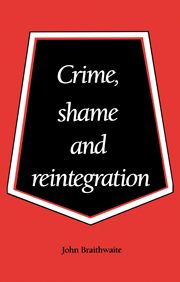Book contents
- Frontmatter
- Contents
- Preface
- 1 Whither criminological theory?
- 2 The dominant theoretical traditions: labeling, subcultural, control, opportunity and learning theories
- 3 Facts a theory of crime ought to fit
- 4 The family model of the criminal process: reintegrative shaming
- 5 Why and how does shaming work?
- 6 Social conditions conducive to reintegrative shaming
- 7 Summary of the theory
- 8 Testing the theory
- 9 Reintegrative shaming and white collar crime
- 10 Shaming and the good society
- References
- Index
6 - Social conditions conducive to reintegrative shaming
Published online by Cambridge University Press: 05 June 2012
- Frontmatter
- Contents
- Preface
- 1 Whither criminological theory?
- 2 The dominant theoretical traditions: labeling, subcultural, control, opportunity and learning theories
- 3 Facts a theory of crime ought to fit
- 4 The family model of the criminal process: reintegrative shaming
- 5 Why and how does shaming work?
- 6 Social conditions conducive to reintegrative shaming
- 7 Summary of the theory
- 8 Testing the theory
- 9 Reintegrative shaming and white collar crime
- 10 Shaming and the good society
- References
- Index
Summary
The Comparative Literature
In this chapter we will argue that the fundamental societal conditions conducive to cultural processes of reintegrative shaming are communitarianism and interdependency. These are the characteristics which the criminologists who have studied the Japanese crime situation have concluded to be at the heart of Japanese success in securing low and declining crime rates (see Chapter 4). Clinard (1978) concluded that the decentralization and communitarianism of the Swiss canton system, with its heavy reliance on citizen assumption of responsibility for crime control, was important in understanding the low Swiss crime rates, a conclusion endorsed by Adler (1983).
Adler's Nations Not Obsessed With Crime is the most ambitious comparative study of countries believed to have low crime rates. It can justifiably be criticized as a work based on shaky foundations (Mukherjee, 1985) though the totally unsatisfactory state of comparative data on crime rates is of course not the fault of Adler, who studied ten countries which she believed (largely on the basis of a United Nations survey) to have low crime rates: Switzerland, Ireland, Bulgaria, the German Democratic Republic, Costa Rica, Peru, Algeria, Saudi Arabia, Japan and Nepal. She concluded that a Durkheimian condition of social solidarity, which she called ‘synnomie’, was a characteristic these low crime countries shared. These conclusions were based on very limited data, to say the least. However, Adler's synnomie is very similar to the communitarianism which other comparativists like Bayley, Clifford and Clinard have discussed.
- Type
- Chapter
- Information
- Crime, Shame and Reintegration , pp. 84 - 97Publisher: Cambridge University PressPrint publication year: 1989



